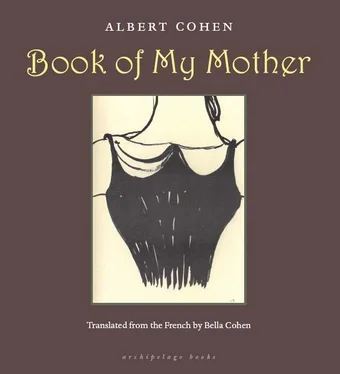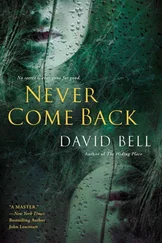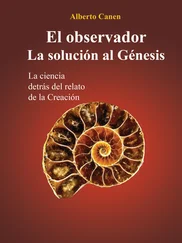Albert Cohen - Book of My Mother
Здесь есть возможность читать онлайн «Albert Cohen - Book of My Mother» весь текст электронной книги совершенно бесплатно (целиком полную версию без сокращений). В некоторых случаях можно слушать аудио, скачать через торрент в формате fb2 и присутствует краткое содержание. Год выпуска: 2012, Издательство: Archipelago Books, Жанр: Современная проза, на английском языке. Описание произведения, (предисловие) а так же отзывы посетителей доступны на портале библиотеки ЛибКат.
- Название:Book of My Mother
- Автор:
- Издательство:Archipelago Books
- Жанр:
- Год:2012
- ISBN:нет данных
- Рейтинг книги:5 / 5. Голосов: 1
-
Избранное:Добавить в избранное
- Отзывы:
-
Ваша оценка:
- 100
- 1
- 2
- 3
- 4
- 5
Book of My Mother: краткое содержание, описание и аннотация
Предлагаем к чтению аннотацию, описание, краткое содержание или предисловие (зависит от того, что написал сам автор книги «Book of My Mother»). Если вы не нашли необходимую информацию о книге — напишите в комментариях, мы постараемся отыскать её.
, which later grew into
. Achingly honest, intimate, moving, it is a tribute to all mothers.
Albert Cohen
Solal
Mangeclous
Belle du Seigneur
Les Valereux
Book of My Mother — читать онлайн бесплатно полную книгу (весь текст) целиком
Ниже представлен текст книги, разбитый по страницам. Система сохранения места последней прочитанной страницы, позволяет с удобством читать онлайн бесплатно книгу «Book of My Mother», без необходимости каждый раз заново искать на чём Вы остановились. Поставьте закладку, и сможете в любой момент перейти на страницу, на которой закончили чтение.
Интервал:
Закладка:
Albert Cohen
Book of My Mother
I
EVERY MAN IS ALONE and no one cares a rap for anyone and our sorrows are a desert island. Yet why should I not seek comfort tonight as the sounds of the street fade away, seek comfort tonight in words? Oh, poor lost creature who sits at his table seeking comfort in words, at his table with the phone off the hook for he fears the outside, and at night with the phone off the hook he feels like a king, safe from the spiteful outside, so soon spiteful, gratuitously spiteful.
What a strange little joy, sad and limping yet sweet as a sin or a drink on the sly. What a joy even so to be writing just now, alone in my kingdom and far from the swine. Who are the swine? Do not expect me to tell you. I want no trouble with those from outside. I do not want them to come and disturb my would-be peace and prevent me from writing pages by the dozen or the hundred as this heart of mine, my destiny, may dictate. I have resolved to tell all painters they are geniuses; otherwise they bite. And in general I tell everyone that everybody is charming. Such are my daytime manners. But in my nights and my dawns my thoughts are not constrained.
Sumptuous, O my golden pen, roam over the page, roam at random while I yet have some youth; wend your slow, erratic way, hesitant as in a dream, faltering but controlled. Roam on, pen, I love you, my sole consolation; roam through the pages which give me dismal delight and in whose squinting eye I gloomily revel. Yes, words are my homeland, words console and avenge. But words will not bring back my mother. Brimful though they be of the vibrant past drumming at my temples and distilling its fragrance, the words I write will not bring back my dead mother. That subject is banned in the night. Begone, vision of my mother living when I saw her for the last time in France. Begone, maternal wraith.
SUDDENLY, because all is tidy on the table where I write, and because I have a cup of hot coffee and a cigarette just lit and a lighter that works and a pen that writes well, and because I am by the fire with my cat at my side, I feel a surge of delight so intense that I am moved — moved to pity for myself, pity for that childish capacity for boundless joy which bodes no good, pity for the pleasure I find in a pen that writes well, pity for this poor devil of a heart which would suffer no more and clutch at some reason for loving in order to live. For just a few minutes I bask like a bourgeois in a little oasis of comfort and order. But a sorrow lurks below, unremitting, unforgettable. Yes, it is grand to be bourgeois like them for a while. We love to be what we are not. There is no greater artist than a genuine middle-class lady drooling over a poem or going into a trance and frothing at the mouth at the sight of a Cézanne and pontificating as she jabbers in some jargon she has scrounged here and there with no inkling of what it means and nattering about mass and volume and proclaiming that red is so sensual. Sensual, my foot! I have lost my thread. Well, let’s make a little doodle in the margin to conjure up ideas — a consolation doodle, a doleful little doodle, a dawdling doodle to be packed with decisions and plans, a dinky little doodle, a curious isle and a land of the soul, a sad oasis for thoughts that follow its curves, a wee-bit-crazy little doodle, neat, childish, docile, and filial. Hush, do not awaken her, daughters of Jerusalem. Do not awaken her while she sleeps.
“Who sleeps?” inquires my pen. Who but my mother — eternally. Who but my mother — that is my grief. Do not awaken her, daughters of Jerusalem. Do not awaken my grief that lies buried in the graveyard of a town whose name I may not speak, for that name means my mother deep down in earth. Come, pen, flow free once more, be resolute, sober, and sensible, take up anew your task of enlightenment, steep yourself in willpower and do not make such long commas: that is not a bright idea. Soul, O my pen, be valiant and diligent, leave the dark land, cease to be wild, near-mad and possessed, morbidly stilted. And you, my sole friend, you whom I face in my mirror, hold back your dry sobs and, since you would so dare, tell of your dead mother with a fake heart of bronze, tell of her calmly, pretend to be calm, it may be — who knows? — no more than a habit which can be acquired. Tell of your mother in her serene manner, whistle softly to imagine things are not all that bad, and above all smile — never forget to smile. Smile to cheat in your despair, smile to go on living, smile in your mirror and at people and even at this page. Smile with your bereavement, which pants faster than fear. Smile to make yourself believe nothing matters, smile to make yourself simulate living, smile with the sword of your mother’s death hanging over you, smile all your life till you can bear it no more, smile till you die of that perpetual smile.
II
ON FRIDAY AFTERNOON, which for Jews marks the beginning of the holy Sabbath day, she would make herself beautiful. She would put on her solemn black silk dress and such jewels as were left to her. For I was open handed in my lighthearted adolescence and gave banknotes to beggars if they were old and long bearded. And if a friend liked my cigarette case, the gold case was his. In Geneva, when I was a student with wild black locks exalting my head and a heart that was ardent and sometimes crazy though tender, she had sold her finest jewels. She was so proud of them, poor darling; they were essential to her simple dignity as the daughter of notables of bygone age. How often — and the jeweler always swindled her — had she sold some of her jewels for me, unbeknown to my father, whose sternness, which we feared, fed our complicity. I can see her now, leaving that jeweler’s shop in Geneva, so proud of the small large sum she had got for me, happy, heart-stirring in her joy, happy to have sold her cherished ear pendants for me, her rings and her pearls, which were her caste marks, her honor as a lady of the Orient. So happy, my darling, walking with difficulty even then, already dogged by death. So happy to despoil herself for me, to ply me with banknotes which would flame and vanish in but a few days in my nimble young hands, quick to give them away. I took, wild that I was and wreathed in sunlight and not much concerned about my mother, for I had fine dazzling teeth and I was the loved though loving lover of this pretty girl and that fair lass and so on without end, infinite reflections in the mirrors of the castle of love. O curious pallor of my loves long dead! I took the banknotes, and I did not know, for I was a son, that those meager large sums were a sacrifice offered up by my mother on the altar of motherhood. O priestess of the cult of her son, O majesty too long unacknowledged! Too late now.
EVERY SABBATH in Marseilles, where I went from Geneva to spend my leaves, my mother would wait for my father and me to return from synagogue with myrtle sprigs in our hands. When she had finished adorning her modest flat for the Sabbath, the flat that was her Jewish realm and her piteous homeland, she would sit all alone at the ceremonial Sabbath table, and ceremoniously would she wait for her son and her husband. Sitting perfectly still so as not to rumple her Sabbath best, excited and stiff in her corseted dignity — excited because she was smart and respectable and about to find favor with those she loved, her husband and son, whose momentous tread would soon be heard on the stairs; excited because her hair was well combed and gleaming with age-old sweet-almond oil, for she knew little of the arts of titivation; excited as a little girl at a prize giving — my aging mother would wait for her two aims in life, her son and her husband.
Seated under her altar, a portrait of me at fifteen, a frightful portrait which she thought admirable, seated at the Sabbath table where three candles glowed, at the festive table, first fragment of the realm of the Messiah, my mother sighed contentedly but a trifle wistfully, for soon they would arrive, her two men, the lights of her life. Oh yes, she thought happily, they would find the flat spotless and sumptuous on this Sabbath day, and they would commend her for its sparkling trimness, and they would compliment her on the elegance of her dress. Her son, who never seemed to be looking but whom nothing escaped, would cast a quick glance at her brand-new lace collar and cuffs and, yes, they would surely receive his all-important approval. And she would be proud beforehand, would prepare in advance what to say to them, perhaps with some guileless exaggeration of the speed and skill of her domestic accomplishments. And they would see what a capable woman she was, what a queen of the household. Such were the ambitions of my mother.
Читать дальшеИнтервал:
Закладка:
Похожие книги на «Book of My Mother»
Представляем Вашему вниманию похожие книги на «Book of My Mother» списком для выбора. Мы отобрали схожую по названию и смыслу литературу в надежде предоставить читателям больше вариантов отыскать новые, интересные, ещё непрочитанные произведения.
Обсуждение, отзывы о книге «Book of My Mother» и просто собственные мнения читателей. Оставьте ваши комментарии, напишите, что Вы думаете о произведении, его смысле или главных героях. Укажите что конкретно понравилось, а что нет, и почему Вы так считаете.












